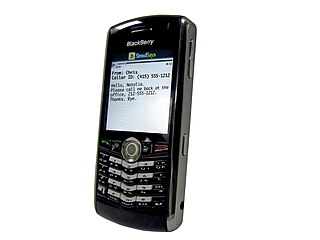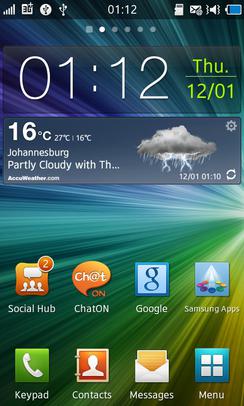Related Research Articles
A software development kit (SDK) is a collection of software development tools in one installable package. They facilitate the creation of applications by having a compiler, debugger and sometimes a software framework. They are normally specific to a hardware platform and operating system combination. To create applications with advanced functionalities such as advertisements, push notifications, etc; most application software developers use specific software development kits.
The Open Mobile Terminal Platform (OMTP) was a forum created by mobile network operators to discuss standards with manufacturers of mobile phones and other mobile devices. During its lifetime, the OMTP included manufacturers such as Huawei, LG Electronics, Motorola, Nokia, Samsung and Sony Ericsson.
Mobile app development is the act or process by which a mobile app is developed for one or more mobile devices, which can include personal digital assistants (PDA), enterprise digital assistants (EDA), or mobile phones. Such software applications are specifically designed to run on mobile devices, taking numerous hardware constraints into consideration. Common constraints include CPU architecture and speeds, available memory (RAM), limited data storage capacities, and considerable variation in displays and input methods. These applications can be pre-installed on phones during manufacturing or delivered as web applications, using server-side or client-side processing to provide an "application-like" experience within a web browser.

Visual voicemail is direct-access voicemail with a visual interface. Such an interface presents a list of messages for playback, as opposed to the sequential listening required using traditional voicemail, and may include a transcript of each message. In 2007, Apple's iPhone was the first cell phone promoting this feature.
Betavine was an open community and resource website, created and managed by Vodafone Group R&D, for the mobile development community in order to support and stimulate the development of new applications for mobile and Internet communications. The Betavine website allows developers to upload and profile their alpha-stage and beta-stage applications, provides interaction tools for members to share knowledge and give feedback on apps, and discuss topics in mobile. Betavine also contains a growing resources section with technical topics and APIs.
Novarra was a mobile internet software company founded in 2000 and based in Itasca, Illinois, United States. It created web-based services such as web internet access, portals, videos, widgets and advertising for mobile devices. Novarra provided access to the internet and other services through wireless handsets, PDAs and laptops and sold directly to operators, mobile handset manufacturers and internet brand companies. In 2010, Nokia acquired 100% of Novarra's shares.

Bada is a discontinued mobile operating system developed by Samsung Electronics for devices such as mid- to high-end smartphones and tablet computers. The name is derived from "바다 (bada)", meaning "ocean" or "sea" in Korean. All phones running Bada were branded with the name Wave, unlike Samsung's Android devices which are branded as Galaxy.

Symbian is a discontinued mobile operating system (OS) and computing platform designed for smartphones. It was originally developed as a proprietary software OS for personal digital assistants in 1998 by the Symbian Ltd. consortium. Symbian OS is a descendant of Psion's EPOC, and was released exclusively on ARM processors, although an unreleased x86 port existed. Symbian was used by many major mobile phone brands, like Samsung, Motorola, Sony Ericsson, and above all by Nokia. It was also prevalent in Japan by brands including Fujitsu, Sharp and Mitsubishi. As a pioneer that established the smartphone industry, it was the most popular smartphone OS on a worldwide average until the end of 2010, at a time when smartphones were in limited use, when it was overtaken by iOS and Android. It was notably less popular in North America.
The Joint Innovation Lab (JIL) is a joint venture between Vodafone, Verizon Wireless, China Mobile and SoftBank Mobile. It is backed up by handset makers LG Electronics, Research In Motion, Samsung Electronics and Sharp Corporation.
BONDI is an API framework aimed at mobile devices. OMTP launched the BONDI initiative, which defined new interfaces and a security framework to enable the access to mobile phone functionality from a browser or widget engine in a secure way.
Application enablement is an approach which brings telecommunications network providers and developers together to combine their network and web abilities in creating and delivering high demand advanced services and new intelligent applications.

RhoMobile Suite, based on the Rhodes open source framework, is a set of development tools for creating data-centric, cross-platform, native mobile consumer and enterprise applications. It allows developers to build native mobile apps using web technologies, such as CSS3, HTML5, JavaScript and Ruby. Developers can deploy RhoMobile Suite to write an app once and run it on the most-used operating systems, including iOS, Android, Windows Phone, Windows Mobile, Windows CE, Windows 10 Mobile and Windows Desktop. Developers control how apps behave on different devices. RhoMobile Suite consists of a set of tools for building, testing, debugging, integrating, deploying and managing consumer and enterprise apps. It consists of the products Rhodes, RhoElements, RhoStudio, RhoConnect, and RhoGallery, and includes a built-in Model View Controller pattern, an Object Relational Mapper for data intensive apps, integrated data synchronization, and a broad API set. These mobile development services are offered in the cloud and include hosted build, synchronization and application management.

Firefox OS is a discontinued open-source operating system – made for smartphones, tablet computers, smart TVs, and dongles designed by Mozilla and external contributors. It is based on the rendering engine of the Firefox web browser, Gecko, and on the Linux kernel. It was first commercially released in 2014.
Wakanda is a JavaScript platform to develop and run web or mobile apps.
HTML5 Audio is a subject of the HTML5 specification, incorporating audio input, playback, and synthesis, as well as in the browser. iOS
OneAPI is a set of application programming interfaces (APIs) supported by the GSM Association that exposes network capabilities over the Internet.
A trusted execution environment (TEE) is a secure area of a main processor. It helps code and data loaded inside it to be protected with respect to confidentiality and integrity. Data integrity prevents unauthorized entities from outside the TEE from altering data, while code integrity prevents code in the TEE from being replaced or modified by unauthorized entities, which may also be the computer owner itself as in certain DRM schemes described in SGX. This is done by implementing unique, immutable, and confidential architectural security such as Intel Software Guard Extensions which offers hardware-based memory encryption that isolates specific application code and data in memory. Intel SGX allows user-level code to allocate private regions of memory, called enclaves, which are designed to be protected from processes running at higher privilege levels. A TEE as an isolated execution environment provides security features such as isolated execution, integrity of applications executing with the TEE, along with confidentiality of their assets. In general terms, the TEE offers an execution space that provides a higher level of security for trusted applications running on the device than a rich operating system (OS) and more functionality than a 'secure element' (SE).
Crosswalk Project was an open-source web app runtime built with the latest releases of Chromium and Blink from Google. The project was founded by Intel's Open Source Technology Center in September 2013.
Universal Windows Platform (UWP) is a computing platform created by Microsoft and introduced in Windows 10. The purpose of this platform is to help develop universal apps that run on Windows 10, Windows 10 Mobile (discontinued), Windows 11, Xbox One, Xbox Series X/S, and HoloLens without the need to be rewritten for each. It supports Windows app development using C++, C#, VB.NET, and XAML. The API is implemented in C++, and supported in C++, VB.NET, C#, F# and JavaScript. Designed as an extension to the Windows Runtime (WinRT) platform introduced in Windows Server 2012 and Windows 8, UWP allows developers to create apps that will potentially run on multiple types of devices.

A progressive web application (PWA), or progressive web app, is a type of application software delivered through the web, built using common web technologies including HTML, CSS, JavaScript, and WebAssembly. It is intended to work on any platform with a standards-compliant browser, including desktop and mobile devices.
References
- ↑ Tanner, John (11 March 2010). "Cellcos get WAC on OS fragmentation". Telecomasia. Retrieved 8 May 2010.
- ↑ Ray, Bill (5 May 2010). "Operator gang gunning for iTunes". The Register. Retrieved 8 May 2010.
- ↑ "Wholesale Applications Community Grows as 32 New Members Join the Open Applications Initiative". 18 October 2010. Retrieved 18 October 2010.
- ↑ "WAC post".
- ↑ "WAC, Meego, eStore: Three Big Moves in Mobile Platform Consolidation". 4 March 2010. Retrieved 7 May 2010.
- ↑ "Wholesale Applications Community Accelerates Delivery of Open Applications Platform". PR newswire. 2010-07-27. Archived from the original on 2024-01-17.
- ↑ Kincaid, Jason (15 February 2010). "The Wholesale Applications Community Sounds Like A Disaster In The Making". TechCrunch. Retrieved 8 May 2010.